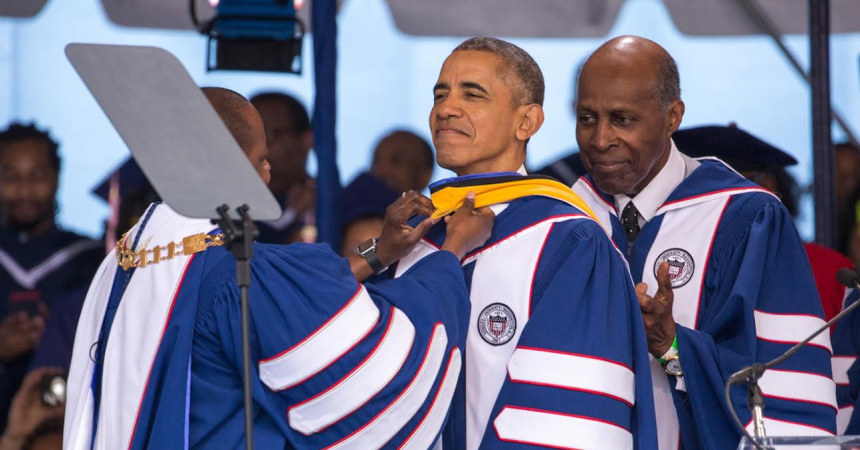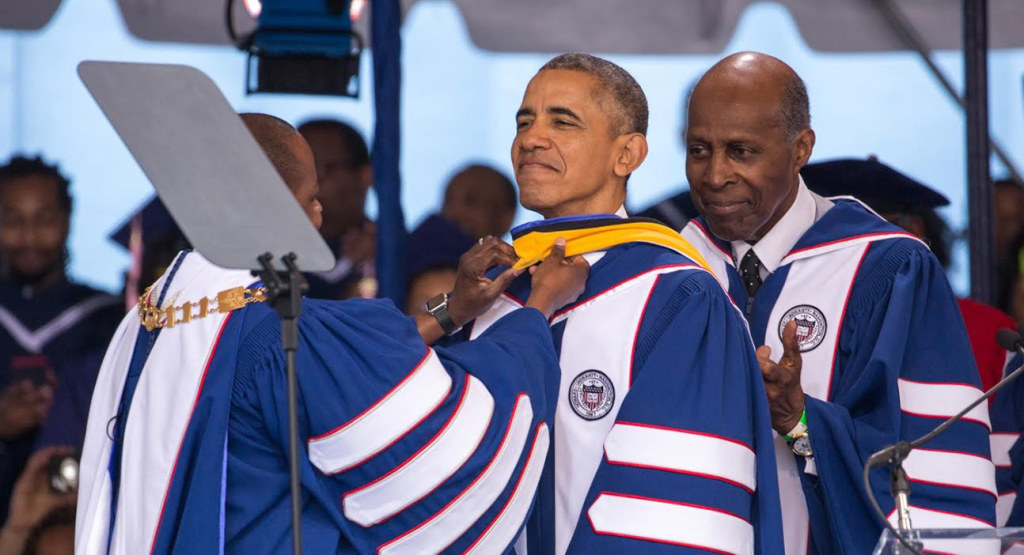
Obama: America is a better place today

President Barack Obama delivered an electrifying speech to Howard University’s graduating class this past Saturday in Washington, D. C.
Photo courtesy of Howard News Service
By Howard University News Service & The NNPA
WASHINGTON — President Barack Obama told the graduates of one of the nation’s leading historically Black universities that America is “a better place today” than it was when he graduated from college. But a great deal more work needs to be done and he urged them to immerse themselves in the political process to bring about the change they seek.
Obama is the sixth sitting American president to deliver the keynote address at a Howard University commencement.
The president told the crowd that passion alone is not enough to cement lasting change.
“If you care about mass incarceration, what are you doing to pressure Congress to pass the pending legislation that might alleviate it?” Obama asked. “Passion is vital, but you’ve got to have a strategy. And your plan better include voting, not just some of the time, but all of the time.”
“When you don’t vote, you give away your power,” Obama said to more than 2,300 Howard University graduates. “Change is the effort of committed citizens … Change requires more than speaking out; it requires listening to those with whom you disagree, and being prepared to compromise.”
“… Let me say this: Even if we dismantled every barrier to voting, that alone would not change the fact that America has some of the lowest voting rates in the free world … Youth turnout — that would be you — was less than 20 percent. Less than 20 percent. Four out of five did not vote. In 2012, nearly two in three African Americans turned out. In 2014, only two in five turned out. You don’t think that made a difference in terms of the Congress I’ve got to deal with? And then people are wondering, well, how come Obama hasn’t gotten this done? How come he didn’t get that done? You don’t think that made a difference? What would have happened if you had turned out at 50, 60, 70 percent, all across this country?”
“People try to make this political thing really complicated. Like, what kind of reforms do we need? And how do we need to do that? You know what, just vote. It’s math. If you have more votes than the other guy, you get to do what you want. It’s not that complicated.”
The graduates and other young people have no excuse because they didn’t have to guess the number of jellybeans in a jar or bubbles on a bar of soap to register to vote. Or risk their lives to cast a ballot.
“Other people already did that for you … When we don’t vote, we give away our power, disenfranchise ourselves — right when we need to use the power that we have; right when we need your power to stop others from taking away the vote and rights of those more vulnerable than you are — the elderly and the poor, the formerly incarcerated trying to earn their second chance.”
“So you got to vote all the time, not just when it’s cool, not just when it’s time to elect a President, not just when you’re inspired. It’s your duty …”
The university also awarded a Doctor of Humanities degree to actress and activist Cicely Tyson, a Doctor of Laws to Ambassador Horace G. Dawson, a pioneering member of the U.S. Foreign Service and founding director of Howard’s Ralph J. Bunche International Affairs Center, and a Doctor of Science to Dr. L.D. Britt, chairman of the Department of Surgery at Eastern Virginia Medical School.
On commencement day, Howard University awarded more than 1,300 bachelor’s degrees, more than 300 master’s degrees, and more than 100 Ph.Ds. The top five areas of concentration were psychology, history, political science, social work and mathematics. Additionally, more than 400 students received professional degrees in law, medicine, pharmacy and dentistry.
Obama lauded the 149-year-old HBCU saying that “the seeds of change for all America were sown here.” He encouraged African Americans to not be afraid to embrace their heritage and coaxed them to be confident in their Blackness. Despite that, he explained, there was no one way to be Black, and no litmus test for authenticity.
“Look at Howard,” Obama said. “One thing most people don’t realize about Howard is how diverse it is. You shatter stereotypes.”
The university bestowed Obama with an honorary doctorate of science – presented by Civil Rights legend and uber-lawyer Vernon E. Jordan, Jr. – for his work and vision of creating The Affordable Care Act.
Under overcast sky and the constant threat of rain, Obama invoked the names of past graduates like Supreme Court Justice Thurgood Marshall and renowned lawyer Charles Hamilton Houston. He also reminded the graduates and their families that in 1983, there were no Black CEOs of Fortune 500 companies and few Black judges when he received a bachelor’s degree from Columbia University.
“As I was preparing these remarks, I realized that when I was first elected President, most of you –the Class of 2016 – were just starting high school. Today, you’re graduating college. I used to joke about being old. Now I realize I’m old. It’s not a joke anymore,” Obama said to laughter. “But seeing all of you here gives me some perspective. It makes me reflect on the changes that I’ve seen over my own lifetime. So let me begin with what may sound like a controversial statement — a hot take. Given the current state of our political rhetoric and debate, let me say something that may be controversial, and that is this: America is a better place today than it was when I graduated from college.”
“Let me repeat: America is by almost every measure better than it was when I graduated from college. It also happens to be better off than when I took office — but that’s a longer story. That’s a different discussion for another speech. But think about it. I graduated in 1983. New York City, America’s largest city, where I lived at the time, had endured a decade marked by crime and deterioration and near bankruptcy.”
Obama ticked off the challenges facing other cities: years of economic stagnation; the stranglehold of foreign oil; a recession where unemployment nearly scraped 11 percent; the auto industry was getting its clock cleaned by foreign competition.
“And don’t even get me started on the clothes and the hairstyles. I’ve tried to eliminate all photos of me from this period. I thought I looked good. I was wrong,” he joked. “Since that year — since the year I graduated — the poverty rate is down. Americans with college degrees, that rate is up. Crime rates are down. America’s cities have undergone a renaissance. There are more women in the workforce. They’re earning more money. We’ve cut teen pregnancy in half. We’ve slashed the African American dropout rate by almost 60 percent, and all of you have a computer in your pocket that gives you the world at the touch of a button.”
In 1983, Obama said, he was part of fewer than 10 percent of African Americans who graduated with a bachelor’s degree.
“Today, you’re part of the more than 20 percent who will. And more than half of Blacks say we’re better off than our parents were at our age — and that our kids will be better off, too,” he said. “So America is better. And the world is better, too. A wall came down in Berlin. An Iron Curtain was torn asunder. The obscenity of apartheid came to an end. A young generation in Belfast and London have grown up without ever having to think about IRA bombings. In just the past 16 years, we’ve come from a world without marriage equality to one where it’s a reality in nearly two dozen countries. Around the world, more people live in democracies. We’ve lifted more than 1 billion people from extreme poverty. We’ve cut the child mortality rate worldwide by more than half.”
“There was a time when ‘a lot of folks didn’t even think Blacks had the tools to be a quarterback.’ Now, Michael Jordan owns the Charlotte Hornets, Rap and Hip Hop are now longer subversive or underground, Shonda Rhimes owns Thursday nights and Beyoncé runs the world.”
“We’re no longer only entertainers, we’re producers, studio executives. No longer small business owners — we’re CEOs, we’re mayors, representatives, Presidents of the United States,” he asserted.
In the face of such success though, Obama spoke of the challenges of racism and inequality and encouraged the graduates to open their eyes, become engaged and not deny the progress African Americans have made because of the foot soldiers and accomplished men and women whose work and sacrifice made their graduation possible.
That work includes closing the income inequality, racial economic, education and gender gaps and reforming a criminal justice system where 2.3 million people are incarcerated and Black and brown men and women are disproportionally punished and put behind bars. Globally, the president said the graduates needed to be prepared to confront myriad problems and challenges such as global conflicts, disease, terrorism and climate change.
“I tell you this not to lull you into complacency, but to spur you into action — because there’s still so much more work to do, so many more miles to travel,” said Obama. “And America needs you to gladly, happily take up that work. You all have some work to do. So enjoy the party, because you’re going to be busy.”
Reporter Barrington M. Salmon contributed to this story.







